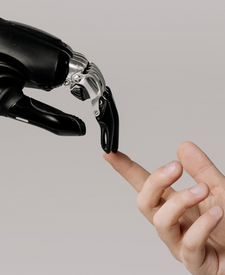The Impact of Artificial Intelligence on Healthcare
In recent years, the world has witnessed remarkable advancements in technology, and one area where these advancements are transforming lives is healthcare. Artificial Intelligence (AI) is playing a pivotal role in reshaping the healthcare landscape, offering new opportunities for diagnosis, treatment, and patient care. In this article, we will explore the profound impact of AI on healthcare, highlighting its benefits, challenges, and future potential.
AI in Medical Imaging
One of the most promising applications of AI in healthcare is medical imaging. Traditional methods of analyzing medical images such as X-rays, MRIs, and CT scans can be time-consuming and prone to human error. AI-powered image analysis algorithms can quickly and accurately detect abnormalities, aiding radiologists in making more precise diagnoses.
For example, AI algorithms can identify early signs of diseases like cancer, often at a stage where treatment is more effective. This not only improves patient outcomes but also reduces the burden on healthcare systems by catching diseases before they become more complex and costly to treat.
Personalized Medicine
AI is also driving the emergence of personalized medicine, tailoring treatments to an individual's unique genetic makeup. By analyzing vast datasets and genetic information, AI can predict how a patient will respond to specific medications, enabling doctors to prescribe the most effective treatments with fewer side effects.
Chatbots and Virtual Health Assistants
AI-powered chatbots and virtual health assistants are becoming increasingly prevalent in healthcare. They provide patients with round-the-clock access to medical information, appointment scheduling, and even initial assessments. These tools not only enhance patient engagement but also alleviate the strain on healthcare providers by handling routine inquiries.
Early Disease Detection
AI is making significant strides in early disease detection and prevention. Machine learning algorithms can analyze patient data, including electronic health records and wearables, to identify patterns indicative of potential health issues. For instance, they can detect irregular heart rhythms or spikes in blood sugar levels, prompting timely interventions.
Drug Discovery and Development
The process of drug discovery is notoriously lengthy and expensive. AI is revolutionizing this area by accelerating the identification of potential drug candidates. Machine learning models can analyze vast chemical databases and predict which compounds are most likely to be effective against specific diseases. This not only speeds up drug development but also reduces costs.
Challenges and Ethical Considerations
While the potential benefits of AI in healthcare are immense, there are challenges and ethical considerations that must be addressed. One major concern is data privacy. Patient data is sensitive, and AI systems must ensure that this information is securely handled and not vulnerable to breaches.
Another challenge is the need for regulatory frameworks to govern the use of AI in healthcare. Clear guidelines are essential to ensure that AI applications are safe, effective, and adhere to ethical standards.
The Future of AI in Healthcare
The future of AI in healthcare is incredibly promising. As AI technology continues to advance, we can expect even more significant breakthroughs. Here are some key areas to watch:
1. Telemedicine:
AI-driven telemedicine platforms will provide remote healthcare services, improving access to medical care, especially in underserved areas.
2. Drug Repurposing:
AI will identify new uses for existing drugs, potentially leading to faster treatments for various conditions.
3. Robotics:
AI-powered robots will assist in surgeries, rehabilitation, and patient care, enhancing precision and reducing the workload on healthcare professionals.
4. Healthcare Predictive Analytics:
Advanced AI algorithms will predict disease outbreaks, hospital admissions, and resource requirements, aiding in healthcare planning.
5. Patient Empowerment:
AI-driven health apps and wearables will empower patients to take control of their health by providing real-time monitoring and personalized recommendations.
In conclusion, AI is revolutionizing healthcare by enhancing diagnostics, personalizing treatment, and improving patient care. While challenges and ethical considerations exist, the potential for AI to transform healthcare for the better is undeniable. As AI technology continues to evolve, we can anticipate a future where healthcare becomes more accessible, efficient, and patient-centered. The synergy between human expertise and AI capabilities holds the key to unlocking a new era of healthcare innovation.























